Gay, lesbian priests describe expectation of celibacy to serve in Diocese of Florida under Bishop HowardPosted Feb 24, 2023 |
|
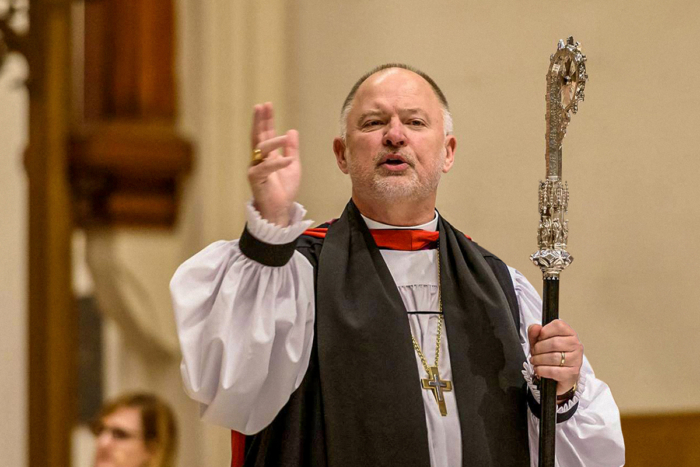
Bishop John Howard has led the Jacksonville-based Diocese of Florida since 2004. Photo: Diocese of Florida
[Episcopal News Service] In 2013, while a parishioner at St. John’s Episcopal Church in Tallahassee, the Rev. Susan Gage discerned a calling to the priesthood. At the time, clergy in the Diocese of Florida warned her the discernment and ordination process there favored straight aspirants over openly gay and lesbian Episcopalians. She had a longtime partner and was not willing to be singled out for celibacy as a lesbian. Still, she met with Bishop John Howard to see if he would allow her to pursue a call. His response left her speechless.
“’While you might have a call, we have a rule in our diocese that we do not ordain people who are partnered and gay,’” Howard said, according to an account of the conversation Gage provided to ENS in a phone interview this week.
“This whole situation is very sad to me,” she told ENS. “It’s just terribly sad.”
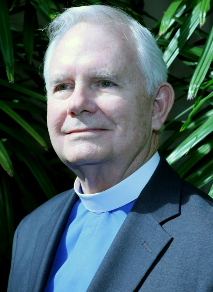
The Rev. Gee Alexander serves as an associate priest for pastoral care at St. John’s Cathedral in Jacksonville. Photo: St. John’s
Another priest reached by ENS, the Rev. Gee Alexander, is canonically resident in the Diocese of Florida and has served there since 1998. He is currently an associate priest for pastoral care at St. John’s Cathedral in Jacksonville. Alexander also is gay, and by his own account, during his 25 years of ordained ministry in the diocese, he has remained celibate. It was his choice, but Alexander says he was given no other option.
When he was received, by then-Florida Bishop Stephen Jecko, the bishop “emphasized that I would remain celibate, unless married to a woman, as long as I was licensed to officiate in the diocese,” Alexander told Episcopal News Service by email. Howard succeeded Jecko in 2004, and “that understanding continues with Bishop Howard,” Alexander said.
Florida has long been known as one of the most conservative dioceses in the church, but only now have specific allegations of discrimination against LGBTQ+ clergy and aspirants to ordination become an issue discussed widely outside the diocese. The allegations form the backbone of an investigative report that casts doubt on the integrity of two 2022 elections to determine who will replace Howard when he retires later this year.
The Rev. Charlie Holt was elected bishop coadjutor both times. Objections to the first election in May 2022 prompted an investigation by the churchwide Court of Review, which concluded a clergy quorum had not been reached and “irregularities in the convention process itself cast a shadow over the legitimacy of the election.” Holt withdrew his acceptance of the result, and the standing committee called for a new election.
Last week, the diocese released the Court of Review’s new report into objections to the second election in November. This time, the Court of Review found, in part, that a pattern and practice of anti-LGBTQ+ discrimination under Howard could have skewed the clergy roster enough to affect the outcome, in which Holt was chosen as bishop coadjutor by a single vote in the clergy order. The court also found separate problems with how lay delegates were selected for voter eligibility in the bishop election.
A group of Episcopal LGBTQ+ leaders issued a letter on Feb. 23 calling for bishops and standing committees to withhold consent of Holt’s election, partly pointing to the discriminatory practices identified by the Court of Review, as well as separate concerns about Holt’s fitness to serve. “It is clear from the Court of Review that the Diocese of Florida intentionally and systemically excluded and marginalized LGBTQ+ clergy and laypeople,” the letter says.
Howard adamantly denies discrimination in his diocese. In his Jan. 11, 2023, letter to the Court of Review, included in the report’s accompanying documentation, he said he has “imposed no special or different conditions” on gay or lesbian clergy seeking canonical residence, adding, “I do not require clergy to take an oath of celibacy.”
Howard did not respond to ENS inquiries himself, though his canon to the ordinary, the Rev. Allison DeFoor, issued similar denials on Howard’s behalf in response to a series of ENS questions for this story. In Gage’s case, he said Howard did not recall the meeting with her.
If celibacy is not required of gay priests in the Diocese of Florida, it would come as a surprise to Alexander. “If I decide my call is to marry a man and the present policy is maintained, I’ll relinquish my [priest] license,” he told ENS. He declined a request for a phone interview, preferring email, citing a busy schedule this week.
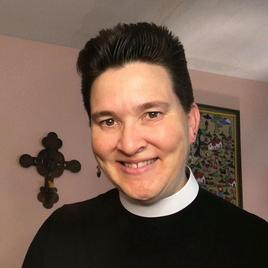
The Rev. Susan Gage is vicar of St. Barnabas Episcopal Church in Valdosta, Georgia. Photo: St. Barnabas
Gage continued to discern a call to the priesthood – in the Diocese of Georgia. She was ordained there by Bishop Frank Logue in January 2022. Now married, she and her wife still live in Florida, but she commutes about 90 minutes each way to serve as priest-in-charge at St. Barnabas Episcopal Church in Valdosta, Georgia.
“I’m actually very happy in the Diocese of Georgia,” she said. “I find that life over the border is much different.”
Howard will reach the church’s mandatory retirement age of 72 in September. In February 2021 he called for the election of a bishop coadjutor. If Holt doesn’t receive the required churchwide consents and another bishop isn’t installed, the Florida Standing Committee will assume the role of ecclesiastical authority in the interim.
The standing committee, in its Feb. 17 release of the Court of Review’s findings, accused the court of “ranging far beyond its mandate” and demonstrating “a faulty grasp of diocesan policies and practices” based on “a number of anonymous allegations — reported so vaguely they cannot be independently verified.”
ENS was able to identify and contact several of the individuals who made the core allegations documented in the Court of Review’s report, as well as others who had firsthand experience with the diocese’s practices and Howard’s positions. Some of those individuals were willing to be identified by ENS. Others confirmed allegations that already were public but declined to be interviewed on the record.
While diocesan leaders attempt to rebut allegations of discrimination, Howard has long voiced in public his conservative views toward gay ordination, same-sex marriage and homosexuality in general. Only now, two decades into his leadership, are those views giving way to uncertainty over who will lead the diocese when he is gone as long-simmering divisions in the diocese boil over.

Florida Bishop John Howard reads the results of the bishop coadjutor election on Nov. 19, 2022, election. Image source: Diocese of Florida
The Episcopal Church has prohibited discrimination on the basis of sexual orientation at least since 1994 when General Convention approved a brief addition to the canons on ministry: “No one shall be denied access to the selection process for ordination in this Church because of race, color, ethnic origin, sex, national origin, marital status, sexual orientation, disabilities or age.” The church further expanded that language at subsequent meetings.
A more extensive revision in 2003 established that sexual orientation “shall not be a factor in the determination of the Ecclesiastical Authority as to whether such person is a duly qualified Priest.” The revision also specified that a bishop could not deny priests licenses to serve because of sexual orientation.
General Convention in 2003 also voted to affirm the Diocese of New Hampshire’s election of the Rev. Gene Robinson as the first openly gay, partnered bishop in The Episcopal Church. At the same General Convention, Howard received approval as Florida’s bishop coadjutor, and Howard and Robinson were consecrated a day apart in November 2003.
Howard was later installed as bishop diocesan on Jan. 29, 2004, when Jecko retired, and in his first address to diocesan convention, he left no doubt about his views on gay ordination.
“Let me be clear, I am a theological conservative,” he said, according to the minutes from the convention. “As bishop of this diocese, I will support and lift up the institution of marriage. And so long as I am bishop of this diocese, none in an active homosexual relationship – or any other sexual relationship outside of marriage – will be ordained or admitted into the process for ordination.”
Howard again voiced opposition to allowing openly gay clergy in his diocese in 2006 after returning from that year’s General Convention.
“While it is not a sin to be a homosexual, the practice of genital homosexual sex is not approved by the church, is not blessed by the church, and those who are living in same sex relationships will not be ordained in this diocese, and such relationships will not be blessed by the church in this diocese,” Howard is quoted as saying in a diocesan newsletter article about the bishop’s briefings at congregations in the diocese. A copy of the newsletter was provided to ENS by one of the sources for this story but could not be linked to online.
In 2009, after General Convention approved trial liturgies for same-sex blessings, a Florida Times-Union article quoted Howard as saying the blessings wouldn’t be available in his diocese. He also repeated his opposition to openly gay clergy serving in the Diocese of Florida.
Howard’s canon to the ordinary, DeFoor, in responding to ENS on the bishop’s behalf, did not comment directly on those historical examples. He instead noted in an email that a diocesan canon governing “the conduct of clergy” requires Florida clergy to “pattern their lives in accordance with the teaching of Christ so that they may be wholesome examples to their people, including, but not limited to, abstaining from sexual relations outside of Holy Matrimony.”
For most of Howard’s episcopate “it was not possible for people living in same-sex relationships to follow that canon,” DeFoor said. That changed after a 2015 U.S. Supreme Court ruling made same-sex marriage legal in all 50 states. General Convention voted immediately afterward to eliminate canonical language defining marriage as between a man and a woman and to offer trial marriage rites to same-sex couples.
Howard initially refused to allow the use of those trial rites in his diocese, but in 2018, General Convention ordered him and several other holdout bishops to make accommodations for same-sex couples wishing to marry in their dioceses. Since then, DeFoor said, “it is now possible for people in same-sex marriages to conform to the diocesan canons, and there is no bar against them.”
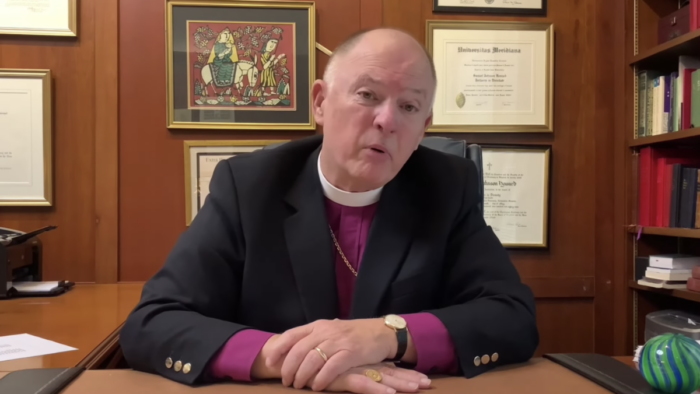
Bishop Samuel Johnson Howard addresses the Diocese of Florida on Aug. 26, 2022, about holding a new bishop coadjutor election. Image: Diocese of Florida video
Gay and lesbian priests and aspirants from the Diocese of Florida tell a more nuanced and sometimes wrenching story. They say they felt compelled to curb their sexuality and sexual identities, based on often unspoken diocesan codes of conduct that have not been applied equally to straight clergy, multiple sources told ENS, including in the years since same-sex couples were able to marry in Florida and in the diocese.
Some of their allegations were summarized in the Court of Review’s report and accompanying exhibits, which maintained the anonymity of most of the priests interviewed by the court. ENS reached five of the priests to confirm their stories.
In addition to Alexander and Gage, a gay priest identified in the report as “Priest #3” said he had remained celibate because he understood that it was required for him to serve in the diocese. He has since retired and declined to be interviewed on the record by ENS other than to confirm information collected by the Court of Review.
“Priest #2” is a partnered lesbian who told the Court of Review she moved to Florida in 2017 but was blocked from obtaining a paid call at a congregation in the diocese. She confirmed this to ENS but declined to be interviewed for this story.
And “Priest #7” told the Court of Review that he discerned a call to the priesthood in 2018 but was told by other priests in the diocese that, as a gay man, he would be expected to remain celibate under Howard’s leadership. ENS reached the Rev. Chris Schwenk by phone, and he confirmed in an interview that he is “Priest #7.”
Schwenk explained that he was a parishioner at St. John’s Episcopal Church in Tallahassee at the time. The Rev. David Killeen, then St. John’s rector, had encouraged Schwenk in his spiritual journey but warned him that Howard’s conservative views could be an obstacle.
Schwenk said Killeen agreed to ask Howard directly if he would consider him for the priesthood despite the aspirant’s wish to keep open the option of dating men and possibly marrying. “Bishop Howard asked for six weeks to pray about that,” Schwenk recalled, “and ultimately came back with the answer: No.”
Killeen, who left St. John’s in 2021 to pursue a doctoral degree, declined to talk to ENS for this story.
Schwenk said the rejection by Howard turned him away from the Diocese of Florida, but he still was able to attend seminary at the University of the South in Sewanee, Tennessee, and gain a postulancy in the Diocese of Pennsylvania. He was ordained to the priesthood by Pennsylvania Bishop Daniel Gutiérrez in November 2022.
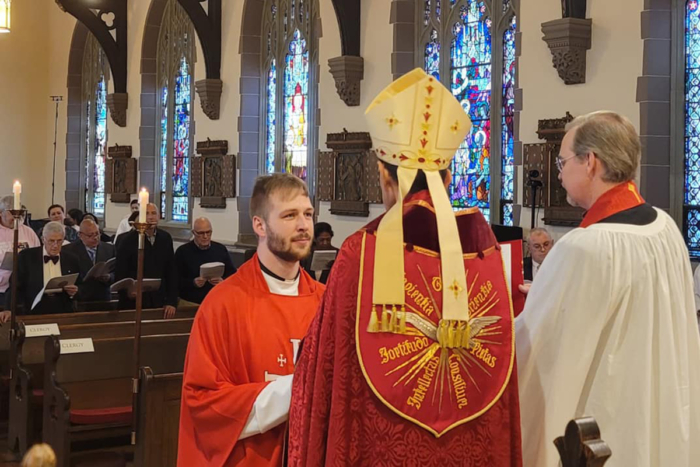
The Rev. Chris Schwenk is ordained by Pennsylvania Bishop Daniel Gutiérrez in November 2022. Photo courtesy of Chris Schwenk
Schwenk now serves as vicar of St. John’s Church at Diocesan Center in Norristown, Pennsylvania. He and his husband will celebrate their first wedding anniversary in June.
He was still in Florida in 2018 when General Convention passed Resolution B012, forcing Howard to allow same-sex couples to marry in his dioceses’ churches if the priests and congregations wished to offer the rites. Schwenk’s own parish, St. John’s, later became one of the first to offer such weddings.
But by the time he left the diocese to attend Sewanee in August 2019, Schwenk said he still didn’t sense any shift in the ordination practices and expectations placed on gay aspirants in the Diocese of Florida.
“As long as Bishop Howard was there, I was fully confident that it wasn’t going to change,” Schwenk said.
– David Paulsen is a senior reporter and editor for Episcopal News Service. He can be reached at dpaulsen@episcopalchurch.org.

Social Menu